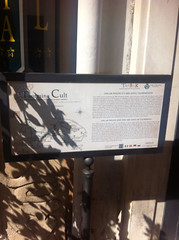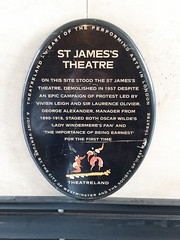Oscar Wilde
Commemorated on 14 plaques
Oscar Wilde 1854-1900 wit and dramatist lived here
34 Tite Street, Kensington and Chelsea, SW3, London, United Kingdom where they lived
In a house on this site Oscar Wilde 1854-1900 wrote The Importance Of Being Ernest in 1894
The Esplanade, Worthing, United Kingdom where they wrote
The first performances of 'A Woman of no Importance' 19th April 1893 and 'An Ideal Husband' 3rd January 1895 by Oscar Wilde were presented at this theatre
Suffolk Street, London, United Kingdom where they had works performed
Oscar Wilde and Arthur Conan Doyle dined here with the publisher of 'Lippincott's Magazine' on 30 August 1889, a meeting that led to 'The Sign Of Four' & 'The Picture Of Dorian Gray'
Langham Hotel, 1c Portland Place, London, United Kingdom where they dined
Oscar Wilde 1854-1900 Poet, dramatist, wit lived here 1855-1878
2 Merrion Square, Dublin, Ireland where they lived
Babbacombe Cliff home to one of Britain's most famous playwrights during the winter of 1892-93 Oscar Wilde poet, self-styled leader of the aesthetic movement, wit, playwright and father. Born October 16th 1854 died November 30th 1900. Author of the famous play The Importance Of Being Ernest
Babbacombe Beach Road, Torquay, United Kingdom where they lived
Oscar Wilde 1854-1900 Writer and Wit at school 1864-1871
Portora Royal School, Enniskillen, United Kingdom where they attended school
Oscar Wilde Poète et Dramaturge Né à Dublin Le 15 Octobre 1856 Est mort dans cette maison Le 30 Novembre 1900
English translation: Oscar Wilde Poet and Dramaturge Born in Dublin 15 October 1856 died in this house 30 November 1900 [AWS Translate]
13 Rue des Beaux Arts, Paris, France where they died (1900)
Poet Dramatist Wit Oscar Wilde Do rugadh sa teach seo 16-10-1854
21 Westland Row, Dublin 2, Dublin, Ireland where they was born (1854)
Texas Historical Marker #08031
Excelsior House. Oldest hotel in East Texas. Frame part built in 1850s; brick wing added 1864. Among famous guests during river port days of Jefferson were Presidents Grant and Hayes, and poet Oscar Wilde. Restored 1961-63 by Jessie Allen Wise Garden Club. Recorded Texas Historic Landmark - 1966 #8031
Vale St. and Austin, Jefferson, TX, United States where they was
Ici Charles Baudelaire, Jean Sibelius, Richard Wagner, Oscar Wilde ont honoré Paris de leur séjovr
English translation: Here Charles Baudelaire, Jean Sibelius, Richard Wagner, Oscar Wilde have honoured Paris with their visit
19 quai Voltaire, Paris, France where they was
Taormina Cult #11
Oscar Wilde [full inscription unknown]
Corso Umberto, Taormina, Italy where they stayed (1898)
St James's Theatre On this site stood the St James's Theatre, demolished in 1957 despite an epic campaign of protest led by Vivien Leigh and Sir Laurence Olivier. George Alexander, manager from 1890 - 1918, staged both Oscar Wilde's "Lady Windermere's Fan" and "The Importance of Being Earnest" for the first time. A joint venture by the City of Westminster and the Society of West End Theatre
23-24 King Street, London, United Kingdom where they was
Oscar Wilde 1854-1900 celebrated playwright and poet, was the victim of homophobic abuse at this station whilst being transferred from Wandsworth Prison to Reading Gaol. 2.00 to 2.30pm, 20 November 1895
Platform 10, Clapham Junction Railway Station, London, United Kingdom where they was


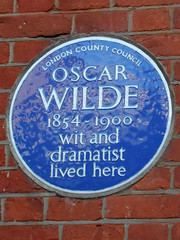
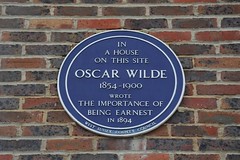
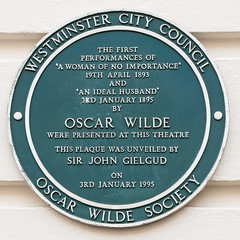
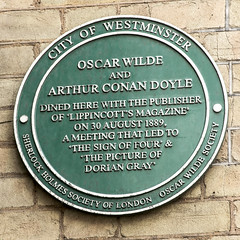
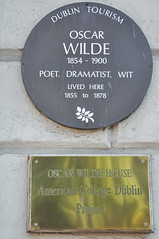
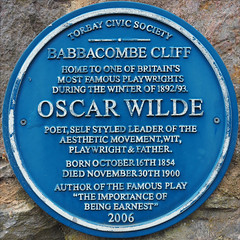


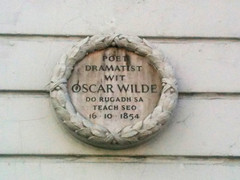
.jpg?width=250)

